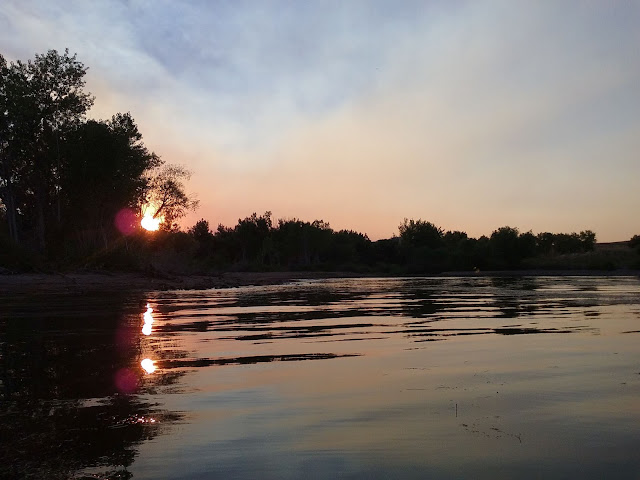The smoke hangs over water as it usually does here in the Western US late summers, since we broke the weather. There's always a wild land fire burning somewhere by September, and typically more than one.
The hours started unhappy. I've been slowly catching and transferring some carp trapped in a pond by receding waters, over the summer. This is the same pond as the last carp rescue of 2014. The carp fly-fishing forum used to rally the troops for that rescue is now defunct, so had no way to roust anyone else to help. On Monday evening there were more carp than water in the pool, netted four out on my way home after walking the dog. Then life got in the way and I didn't make it back until Thursday which was too late. There were four alive with their backs showing dry above the water. Those were retrieved and transferred to the main lake.
Being of a neurotic tendency, waded back through the ooze and counted 26 dead. Previously had caught eight on fly through the summer while the pond was high, so sixteen saved, twenty-six not. On the other hand the great blue herons were happy. Two of them were feasting on the remains when I arrived, and circled back down when I left.
After that I was a bit downcast. Drove around to one of the inlets hoping for carp or maybe a stray bass or walleye, waded through weedbeds out to rib-deep in the main lake. A couple of little bass took the carp fly, so switched to a big Gurgler fly with foam and hair and lots of legs, just for the fun of watching the bass attack it on the surface. Every cast after that got a take.
Missed quite a few big splashy aggressive takes as their handsome broad green backs broke the water around the fly. Hooking these surface takes can be tricky, as the fish will hit the fly hard just to cripple it, rather than take it into their mouths. A variety of theories did not help - tried an immediate strike (well not 'tried' frankly, just reacted and yanked back on the first few, in blind frenzied excitement); tried waiting for a pull but never got one; tried counting one before striking, then count for two, then count for three. Eventually just kept a slow steady retrieve continued until the fish was felt. This required the difficult exercise of impulse control, adding an element of virtuous smug self-satisfaction when it actually worked. The bass were attacking shoals of shad on the surface, plop Gurgler near that and someone would immediately show up. At dark was still getting hits on that fly,
but switched to a big white streamer hoping for a walleye. A couple more bass, biggest of the day at 14", then quiet for a while with only a few little 'uns.
An astonishing evening until then - fastest fishing I've ever experienced, first time ever catching Chatfield bass in the fall, first time in my fishing life of several decades to see the aggressive bass of myth and legend. Guess that's why we go fishing, to see what happens. As John Buchan wrote,
The charm of fishing is that it is the pursuit of what is elusive but attainable, a perpetual series of occasions for hope.
Tried again last night and got the skunk. The problem with big water is the same as with sea fishing – with all that water, most of it is empty, most of the time. Usually I come home from a big water skunk with the sneaking feeling that I might as well have been soaking flies in the bathtub, for all the fish that saw them. The consequence of this is that it’s impossible to be a successful casual big water fisher. It takes large investments of money – for the boat, depthfinder, gas money for outboards, guides etc – and time, to figure out where and when the water will actually be holding fish.
This day showed the typical fall pattern for this lake. That is the shallows pullulating, thrumming, and seething with small young of the year shad minnows, with none of the predatory fish feeding on them. The best theory I have is there are so many shad, the predators only need to swim around with their mouths open for an hour or so, to fill themselves to satiety. The trick is to be on the water in those few unforgiving minutes.
In the gathering dark two great horned owls flew a pattern overhead for which there must have been a purpose and reason, though I could not understand it. Between the harvest moon rising and the sunset it was almost worth it.






